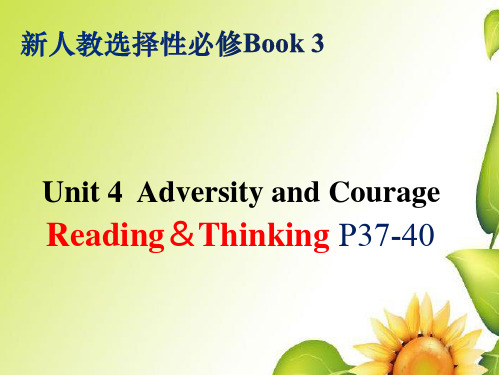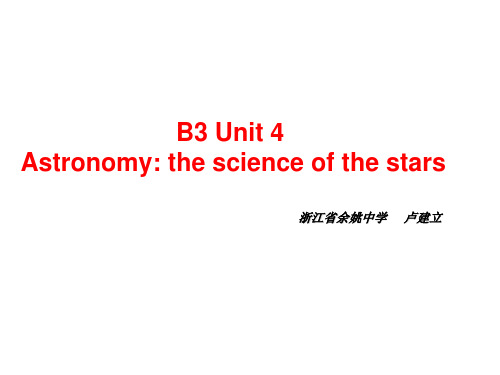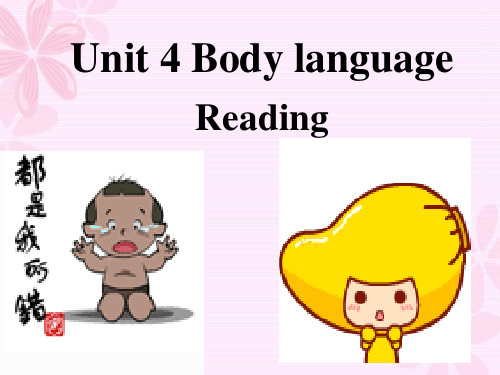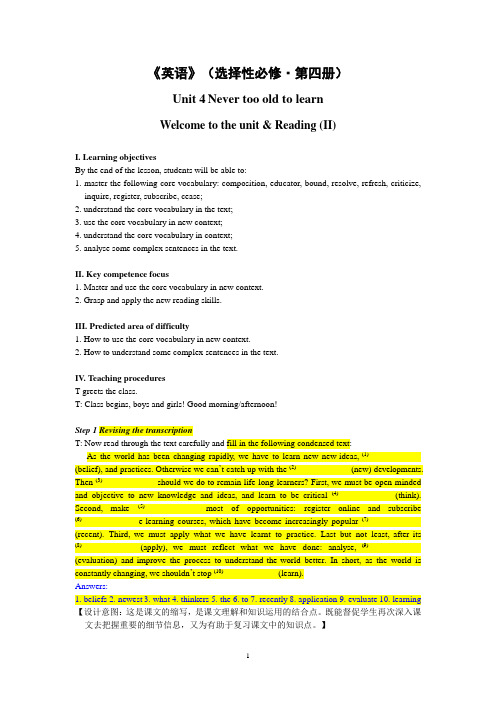B2Unit4 workbook Reading Task
高中英语模块3Unit 4 Reading and Thinking P37-40

② What personal qualities did Shackleton, Wild, and Blackborow exhibit? Find examples from the text to support your answers.
Shackleton showed kindness when he allowed Blackborow to stay on the ship and gave him a job. He showed calmness when he asked the crew to collect essentials. He showed he was not selfish when he left his gold behind, but showed he was thinking of other's feelings by allowing Hussey to keep his banjo. He showed great bravery by setting off to find help for the rest of the crew. Wild was shown to be kind when he tried to lift Blackborow's spirits. Blackborow was enthusiastic at first, making sure he got on the expedition. Although he felt low later, he tried to think about better things, showing again his positive character.
We had to throw away all our belongings except some basic
必修三Unit4Reading How Life Began on the Earth

B. 木星 Jupiter ______
C. 火星 ______ Mars D. 水星 Mercury ________
E. 海王星 Neptune _______
Pluto(冥王星)? a dwarf planet
1111
In our solar system eight planets circle around the sun.
The Solar System
In our solar system eight planets circle around the sun.
The Solar System
Can you name the eight planets?
Earth A. 地球 ______ Saturn F. 土星 ________ G. 天王星 Uranus _______ H. 金星 ________ Venus
solar energy
plant trees
B3 Unit 4 Reading:How life began on the earth
Warming up
Chinese Legends (传说)
Pangu separates the sky from the
earth.
His whole body then turns into all
Greenhouse effect
discussion
the earth may become too hot
putting too much carbon dioxide into the air
No life will be on the earth
As a student, what little things can we do for the earth?
译林版高中英语选必四Unit4 Reading I 教案

《英语》(选择性必修·第四册)Unit 4Never too old to learnReading II. Learning objectivesBy the end of the lesson, students will be able to:1. grasp the topic and the general idea of the lesson;2. understand some important details;3. form their own opinions based on the magazine article.II. Key competence focus1. Learn how to use the given information to express oneself.2. Learn how to get a deep understanding of the reading material.III. Predicted area of difficulty1. Using the features of procedural texts to understand the text.2. Using the means of development of a paragraph to understand the text.3. Free discussion about the questions in A3P46.4. Some inferences based on the magazine article.IV. Teaching proceduresStep 1 Welcoming to the unit1. T greets the class.T: Class begins, boys and girls! Good morning/afternoon!T: Open your book at page 43. Let’s have a look at the picture on this page. What do you see on it? T: Right. An old lady is reading a book attentively.T: Look through a few more pictures in this unit and you’ll know something about the topic of the unit: Further learning. The theme of the unit is included in the title “Never too old to learn”. T: Different people learn in different ways. Read the leaflet at page 43 and discuss the questions in pairs.T: What is your learning style?Sample answer:I am a visual learner. I learn best from videos, pictures, diagrams, charts and other visual cues. I understand the information better and remember it more clearly when it is presented to me this way.T: Do you think your learning style will change as you continue your education?Sample answer:I don’t believe that my visual learning style will change into the auditory or physical style.T: Why?Sample answer 1:Visual learning presents subject knowledge in a better way for me to learn, helps me improvemy powers of concentration and encourages me to be creative. I have been using this learning style for a long time, so it is the one that I am most comfortable with and the one I find benefits me the most. For these reasons, I believe my main learning style will not change.Sample answer 2:I think that my learning style will change because as a person and a learner I am always changing too. My current learning style is visual, and I like reading my study materials and writing summary notes that I can study from later. However, I don’t mind trying other learning styles if they help. I find that I also enjoy listening to podcasts and I am able to learn and remember a lot from them, so perhaps in the future I will also use the auditory style more often. 【设计意图:提示学生翻阅44、45和50图表,帮助学生形成本单元的主题概念。
book4_unit4_reading人教版高中英语必修四第四单元

languages are bad. F
5.All members of a culture behave in the
same way.
F
TASK 3:Answer the following questions
1. Is the author of this passage male or female? How do you know ? 2.What were the two mistakes that the author noticed? 3.How can we understand “These actions are not good or bad”?
Fill in the blanks
Body language is used by people for sending messages to one another. In many countries in
the world, men k_is_s__ each other when they meet. In Britain, people usually s_h_a_k_e_ hands
think deeply
stomachache go this way
【课堂互动探究】
Look at the pictures. What are the following ways of communicating?
gesture
posture
facial expression eye contact
Para.1
ParSt.u2mmaDriizfefetrheentmsatuindeidnetas haaccvoerddiifnfegrteont (Parat.h2e-3m) eagnreinetginagndcuksetyomweorrsd. s.
译林版高中英语选必四Unit4 Reading II 教案

《英语》(选择性必修·第四册)Unit 4Never too old to learnWelcome to the unit & Reading (II)I. Learning objectivesBy the end of the lesson, students will be able to:1. master the following core vocabulary: composition, educator, bound, resolve, refresh, criticize,inquire, register, subscribe, cease;2. understand the core vocabulary in the text;3. use the core vocabulary in new context;4. understand the core vocabulary in context;5. analyse some complex sentences in the text.II. Key competence focus1. Master and use the core vocabulary in new context.2. Grasp and apply the new reading skills.III. Predicted area of difficulty1. How to use the core vocabulary in new context.2. How to understand some complex sentences in the text.IV. Teaching proceduresT greets the class.T: Class begins, boys and girls! Good morning/afternoon!Step 1 Revising the transcriptionT: Now read through the text carefully and fill in the following condensed text: As the world has been changing rapidly, we have to learn new new ideas, (1)____________ (belief), and practices. Otherwise we can’t catch up with the (2)____________ (new) developments. Then (3)____________ should we do to remain life-long learners? First, we must be open-minded and objective to new knowledge and ideas, and learn to be critical (4)____________ (think). Second, make (5)____________ most of opportunities: register online and subscribe (6)____________ e-learning courses, which have become increasingly popular (7)____________ (recent). Third, we must apply what we have learnt to practice. Last but not least, after its (8)____________ (apply), we must reflect what we have done: analyse,(9)____________ (evaluation) and improve the process to understand the world better. In short, as the world is constantly changing, we shouldn’t stop(10)____________ (learn).Answers:1. beliefs2. newest3. what4. thinkers5. the6. to7. recently8. application9. evaluate 10. learning 【设计意图:这是课文的缩写,是课文理解和知识运用的结合点。
2019人教版高中英语必修二Unit 4 Reading and Thinking 课件

Similarities: flag ; currency ; military defence .
Differences: educational and legal systems; their own traditions
andeven football teams for competitions. How does the writer develop this paragraph?
WHAT’S IN A NAME?
Which of the names refers to [英国] ?
• The United Kingdom • The UK • Great Britain • Britain • England • The United Kingdom of Great Britain and Northern Ireland
What’s their difference?
The United Kingdom Explained
Predicting
What's in a name?
Skimming
Find out the main idea for each paragraph
Para.1 Para.2 Para.3 Para.4 Para.5
of England
The Kingdom of Great Britain
The United Kingdom of Great Britain and Ireland
Do the four countries work together in all areas?
Para.3 Similarities and differences
(原创精品)新教材unit4 the night the earth didn’t sleep课件
Post-reading
Natural environment Animals City People Animals
Time line
Before the earthquake
During the earthquake
Army
Doctors and nurses
Workers
After the earthquake
• Life is w__e_a_k_, but life can be _p_r_o_te_c_t_e_d_.If we learn how to_p_r_o_te_c_t__ourselves from disasters, we'll be the very_s_u_r_v_iv_o_r_s from the powerful nature.
Part 2: Damage during the earthquake
It seemed as if the world was
At 3:42 am, one of the most deadly… 1/3 of the nation…
In less than one minute a large city lay in ruins.
Data
75% …90% … all …
Bricks covered;
Most bridges fell
Railway tracks useless;
wells with sand
City
More buildings gone
Water, food
electricity hard to get
2/3 of the people dead or injured Thousands of children without parents More than 400,000 killed
【课件】选修四Unit4workbook
The question I am most frequently asked is: “what do you really do for UNIGEF?” Clearly, my task is to inform, to create awareness of
the needs of children. To fully understand the problems of the state of
Up until a year ago, before I was given the great privilege of becoming a
volunteer for UNICEF, I used to be overwhelmed by a sense of
desperation and helplessness when watching television and reading abonances needed are minimal compared to the global
expenditure of this world; when we know that less than half of one percent of today’s world economy would be the total required to eradicate the worst aspects of poverty and would meet their basic human needs over the next 10 years. In
1.Why might someone purchase a gift from this catalogue?
If you buy one of these gifts for a special person, useful things can be given to people who need it as a voluntary contribution in his or her name. Both of you do good things to people who need help.
教材文本 Unit 4 Listening Task (Workbook)
Unit 4 Wildlife Protection(Workbook)LISTENING TASKHu Xiao is interviewing Alice Jones, a volunteer for the International Bird Rescue Research Center (IBRRC), about her work.1 Look at the pictures and predict what the listening willbe about. Then listen once all the way through and see ifyou were right.2 Listen to Part A again and then write down what is themost difficult part of the work according to Alice.__________________________________________________________________________________________3 Go over the following passage guessing the meaning ofthe unknown words. Listen to Part A once more and fill inthe blanks. Write one word for each blank.Feathers (羽毛) are like __________ to keep out __________. Oil that __________ on the water makes their feathers __________ __________ and makes the birds’ skin (皮肤) ____________________. When birds try to remove the oil with their beaks (嘴), they __________ __________ __________ and __________ __________.4 Listen to Part B again and write down the two steps the IBRRC usually takes to help those birds.Step 1: ___________________________________________.Step 2: ___________________________________________.Suggested answer to Exercise 2:It’s saving wild birds covered in oil.Answer key for Exercise 3:raincoats, cold, water, flows, stick, together, get, cold, may, eat, oil, get, sickSuggested answers to Exercise 4:Step1:We comfort the birds.Step2:We clean the birds.LISTENING TEXTSAVING WILD BIRDSPart A:two problemsHu Xiao is a senior high student who shows a great interest in wildlife protection. Today he has got a good chance to interview a volunteer, Alice Brown, from IBRRC. HX:Hello Alice. I’m so interested in your work saving birds! What do you think is the most difficult pan of your work?AB:Well …I suppose it’s saving wild birds covered in oil. That’s the most difficult of all. HX:How does that happen?AB:The oil comes from boats. It floats on the water and covers the bird’s feathers when they swim through it.HX:That sounds terrible. What do you do about it?AB:The first thing we do is make sure the bird hasn’t eaten too much oil. When a bird’s covered in oil, it tries to clean itself with its beak. As it does so, the bird eats some oil and becomes sick.HX:Oh dear! Do the birds always die?AB:Sometimes … but we try to save them. Birds use their feathers like a raincoat to keep out cold water. When feathers are covered in oil, they stick together and a bird’s skin gets cold in the water. So without help the bird would die of cold!Part B:the solutionHX:What do you do with those birds?AB:First, we comfort a bird by feeding it and keeping it warm. Then we clean it. We rub the bird very carefully. We use warm water and a little soap and work quickly as the birds hate being touched.HX:Is this a difficult job?AB:Yes, because it’s very important to do the job quickly.HX:What happens after that?AB:The birds are kept warm and given a rest.HX:I suppose after that they want to touch their feathers with their beaks.AB:Yes, they do. Birds produce a natural oil in their tails and put this over their feathers until they feel better.HX:Thank you. I’ve learned a lot.AB:Not at all. It's been my pleasure.。
译林版八年级英语上册Unit4Reading1-2学案
八年级上册Unit 4 Reading(1)【课前导学】词组翻译1.热衷于做某事 2.装饰房屋3.显得很糟糕4.犯错误5.用...装满…6.把画贴在墙上7.所有家具 8.把某物涂成蓝色9.事实上 10.上课【课堂学习】Step 1 Checkout1.检查预习作业2.请一位学生讲述对于DIY的理解Step 2 Lead-inGroup work1.What do you often do in your free time?2.Guess what I often do in my free time?3.Do you know DIY?4.Do you like DIY? Give us some examples.Step 3.presentation1.出示Andrew手拿DIY工具的图片呈现课题My cousin and DIY.2.快速阅读文章,回答:What’s the article mainly about?3.分析文章结构,归纳大意:Part 1: ( para1) Introduction of AndrewPart 2( para2---4 ) Andrew’s DIY jobsPart 3: ( para5) Advice from Suzy4. 仔细阅读文章,划出生词、难以理解的短语和句子。
(教师巡视课堂,把部分生词、短语板书在黑板上)decorate put in a brighter light have a power cut put up a picture hit a pipe ceiling take a course in DIY attend lessons instead5.通过生生之间、师生之间的互动解决难题。
Step 4.practice【课后拓展】一.根据中文指示或首字母写出单词1. I know nothing about____________(电). I `m not interested in it.2. My uncle is good at ____________ (装饰)his house.3. A car ___________(撞倒)her yesterday , Luckily ,she wasn`t badly hurt.4. All the ____________ (家具)in my house is pink.5. My brother is ___________ (疯狂)about playing computer games.6. In f_____________, you are right.7. You are so careless. You made several m_________ in your homework.8. He ____________(出席)an important meeting in Shanghai last month.9. You`d better paint the _________(天花板)white.10. This question is very easy. H_____________, she can`t answer it correctly.二.选择填空()1.My grandpa is busy ______ the ______ washing machine.A.fix: brokenB. fixing: brokenB.to fix : broke D. fixxing: broke( ) 2.________fact, I know ______more about DIY than my dad.A. In : muchB. At : manyC. In :manyD. On: broke( ) 3.Just now he _______a pike and filled my room _______waterA. hitted: withB. hitted: ofC. hit: withD.hit: of( ) 4.You`d better _______careful, _______you`ll make a mistake.A. are: andB. are; orC.be :andD. be:or( ) 5.Look !There`s a shelf ________his bed.A. onB. underC. belowD. above( ) 6.________good time they had yesterday.A. HowB. What aC. WhatD. How a( ) 7.My brother has some problems _______his English study.A. withB. onC. InD.for( ) 8.All the _______made of __________.A. furnitures are: woodB. furnitures is: woodenC. furniture are: woodenD.furniture is: wood( ) 9. My grandpa is good at Chinese history .He knows ______about it.A. everythingB. somethingC. nothingD. anything( )10.This old man is over 70. _________, he looks young.A. ButB. SoC. HoweverD.Because三.补全对话Millie: What does your dad love to do?Suzy: He love s to d____ our house. However, when he finishes, everything looks ______. Millie: What kind of things does he do?Suzy: Last month, He felt the living room was a bit b_____-. He painted them bule. But he also painted the ceiling, the floor, all the f_____ and even the cat.Millie: That sounds funny!Suzy : What’s m_______ .he spent five days p________ the shelf on the wall for me, but my books couldn`t stay on it. Because one end is much h _________ than the other. Millie: Oh, dear! He should take a c_________ in DIY.Suzy : But he says he already knows e_________ about DIY. Now, I a___________ DIY lessons every week.1._________ 2. _________ 3. _________ 4. _________ 5. _________6. _________7. _________8. _________9. _________ 10. _________八年级上册Unit 4 Reading(2)【课前导学】一、翻译词组,并在课文中划出它们。
